- Home
- Peter Cawdron
Déjà Vu (First Contact)
Déjà Vu (First Contact) Read online
Déjà Vu
Copyright © Peter Cawdron 2021. All rights reserved. The right of Peter Cawdron to be identified as the author of this work has been asserted by him in accordance with the Copyright, Designs and Patents Act 1988. All the characters in this book are fictitious, and any resemblance to actual persons living or dead is purely coincidental
Cover art: NASA Voyager image of Saturn and NASA EVA during ISS Expedition 36
If you enjoy this novel, be sure to sign up for my email newsletter.
Orbit
My gloved hand glides across the hull of the Intrepid as she sits in LEO—a low Earth orbit. Ordinarily, the sight of an entire planet drifting by so calm and serene would be hypnotic, but this spacewalk just hit eleven hours. Swirling white clouds, deep blue seas, jagged coastlines and rugged mountains slide beneath me. I should be relaxed, but I’m stressing. Too much to do. Not enough time.
My headset crackles. The strap on my Snoopy cap is loose. The tiny built-in speakers aren’t quite aligned with my ears, making it difficult to hear.
Space is a contradiction. Flying around like a superhero is cool, but it has its downsides. Being locked away inside a spacesuit makes even the simplest things frustrating. If my nose gets itchy, I have to pull myself against the hull, lean my head to one side, and push my nose against the lining inside my helmet. It’s about as graceful and fun as it sounds.
Adjusting my Snoopy cap is impossible. The strap isn’t square beneath my jaw, causing the speakers to shift away from my ears. Trying to adjust it with a nudge is an exercise in futility, so I give up. Next time, I’ll be more careful when putting on my headset.
From somewhere on the deck of the Intrepid, a voice says, “Coming up on the terminator.”
A day in orbit passes in three-quarters of an hour. It takes us an hour and a half to complete each day/night cycle. Night falls fast—within seconds. My glare visor is only partially down, lessening the brilliance of the Sun reflecting off the azure waters on Earth. As I’m in the shadow of the craft, I raise my visor and pause, waiting for the abrupt change. Dawn is more of a challenge than dusk. The Sun appears from nowhere and can be blinding. At eleven hours, this is “day seven” coming to a close.
“In four, three, two.”
Darkness collapses around me. The spotlights on my helmet come on automatically. I continue on, pulling myself along the outside of the Intrepid.
Each handhold is little more than a thin bar, barely big enough to slip my gloved fingers over. As my legs are drifting behind me, it’s as though I’m working on a climbing wall at the gym, only there’s no weight pulling me down. My visor affords me a wide view, spanning almost 180 degrees, but I’m so close to the hull it’s difficult to see beyond the next rung.
Working in a weightless environment is exhausting. Weightless doesn’t equate to effortless. The pressure within my suit makes it stiff. It’s not unyielding, but it resists my efforts. Even simple tasks, like squeezing a handhold, are difficult after eleven hours. My gloves fight each motion of my hand and fingers, constantly flexing back to a neutral, open position. Legs are useless. They’re the largest muscle group in the human body, and they’re entirely redundant in space.
My shoulders ache from pulling myself along, fighting against the thick material in my suit. The radio crackles to life.
“What’s the status on the cooling pumps?”
Commander Jansen sounds annoyed at the string of technical delays we’ve run into as we prepare to leave orbit. I’m listening on the open channel as she talks to Specialist Jonathan MacArthur at the rear of the Intrepid.
“Still getting patchy readings. Can’t figure out why. Something’s not right.”
The Intrepid uses a fusion ion drive for interplanetary travel and an experimental displacement drive for interstellar journeys. Powerful electromagnets within the engine bay house a sustained fusion core. Feed the dragon H3 tritium and it spits out helium at crazy speeds of anywhere up to 50,000 km/sec. Even so, the mass of the Intrepid is such that our acceleration is lazy. Given time we can reach speeds in excess of three hundred thousand kilometers an hour, more than fifty miles a second. We could go faster, but we need to spend an equal amount of time slowing down when heading to a planet or we’ll go sailing past. It’s a trade-off between fuel spent versus time in transit. The new displacement drive, though, is a game-changer, potentially opening up the stars to humanity—if it works as well as it has in the test runs.
My scanner detects an inconsistency in the output readings from a nearby component. I clamber around the side of the shuttle bay.
“I’ve got two faulty sensors on the emergency exhaust manifold.”
With thick, gloved fingers, I punch the details into my wrist-pad computer. Each press is precise. The virtual buttons on the notepad-sized screen are big, being designed so they’re hard to miss. Even so, when I’m tired, it’s easy to stray to one side and clip the wrong setting. For a moment, I let go of the Intrepid and drift through space, being constrained only by two canvas straps. My tethers are roughly four feet in length, giving me a bit of freedom as I focus on the report.
Down in engineering, MacArthur is as frustrated as the rest of us.
“If she was a car, she’d be recalled.”
We’re two days out from lighting the fireworks and leaving Earth’s orbit. It’ll take six months before we’re out beyond the path of Jupiter. Only then can we engage the displacement drive to jump past light speed. There’s so much energy involved in the maneuver the boffins at NASA are worried the drive may malfunction and shower Earth with gamma rays, so distance is prudent. Earth will be on the other side of the Sun by then and sheltered from any burst.
It’s not a good look to go off searching for life elsewhere while sterilizing your own planet. It doesn’t exactly inspire confidence in punching that big red button, though. On the bright side, if we go nova, we won’t know it. Our bodies will be vaporized in a nanosecond. For the briefest of moments, we’ll outshine every other star in the sky. Making contact with intelligent alien life forms is worth the risk, but it would be nice if we started with a clean build. The Intrepid was constructed on Earth but assembled in space. Our starship was far too big and clumsy to be launched on a rocket so it was built as a kit set in orbit—Eat your heart out, IKEA. The problem is, the chassis was developed in France, the engines in Tennessee, the living quarters in Japan, and so on. It’s been put together like LEGO, but with lots of wiring.
I mumble under my breath, forgetting I’m set to transmit. “We are so not ready.”
“Stow it, Jess.”
Jansen’s not going to delay the departure. There’s too much at stake politically. Who gives a shit? Honestly. Time is meaningless when it comes to the stars.
The boffins have told us the disruption drive will negate relativity. It’s a case of known physics plus salvaged alien technology equals magic, I guess. I don’t believe them. I think it’s a ruse. I’ve seen the sums put together by MacArthur. He’s not stupid. We’re going to exceed the speed of light by at least an order of magnitude. That doesn’t come without a price. He puts it at hundreds of years’ worth of elapsed time back here on Earth for every month we spend outbound. Over a beer, he told me even those figures are optimistic. If all this mumbo jumbo about suspending time-dilation is complete bullshit, we’re looking at hundreds of thousands of years passing back here. That’s time as measured on an evolutionary scale. A hundred thousand years ago, there were four, possibly five hominid species on Earth, the sapiens, neanderthals, heidelbergensis, the hobbit-like floresiensis, and the fading remnants of Homo erectus. Now, there’s just one. Us. And here I am, volunteering to explore the stars.
I’m insanely tired. A
t some point, Commander Jansen’s going to have to call it a day. The law of reverse efforts is setting in. Everything’s becoming stupidly difficult. We’re eating into tomorrow’s reserves. We’re better off hitting the sack and starting fresh with a new day.
My heads-up display blinks as MacArthur speaks.
“Deaf two awe who mons.”
“Say again,” is the response from Jansen. Like me, she’s wondering if she heard him correctly.
“That’s the slogan in the Proc.” He’s referring to Procyon Alpha A, the lead star in a binary system just over 11 light-years away and our first exploration target. “Death to all humans.”
Even though it’s not that funny, I laugh. I’m too tired to care. A gentle tug on my tether brings me back to the hull of the craft. I grab a handhold, dragging my spare tethers along a guide rail as I move on.
Jansen is angry. “MacArthur, you’re not helping.”
“Come on, Commander. Lighten up. You’re pushing us too hard.”
Jansen doesn’t respond to MacArthur so I speak up.
“I can’t keep going. The tank’s empty.” As Jansen can see my remote telemetry, she must realize I’m not talking about air reserves or electricity. I’m exhausted.
She waits before replying, but there’s a hint of resignation in her voice. “We’re less than a third of the way through the checklist.”
I say, “They need to give us more time. Like everyone, I’d love to launch on the fourth of July, but we’re in danger of missing something crucial by rushing.”
MacArthur is more succinct.
“It’s not our fault.”
Mission control doesn’t look fondly on open defiance in space. When the crew of Skylab 4 pushed back against their workload, they got concessions in space and feet stuck firmly on the ground when they returned. But, hey, none of these guys will be alive when we get back. If MacArthur’s right, Homo sapiens could have evolved into some other species by then, just as Homo egaster and Homo erectus led to us. It’s madness. Even if the eggheads in Houston are right, and the effects are negated, we’ll still skip ahead at least a few decades during the trip. The elasticity of spacetime messes with my head.
I feel for Jansen. She’s the meat in the sandwich. Damned if she gives into us. Damned if she doesn’t and pushes us to breaking point.
“Houston, Intrepid,” she says as though Houston hasn’t been listening in all along. I bet they’re not on the same shift down there.
“We copy you, Intrepid.”
“We’ve been working through the commissioning checklist, but we’re not even halfway. Over.”
“Copy that, Intrepid. Standby.”
I stop clambering over the hull and float where I am, mentally retracing the route to the main airlock, hoping a recall is approved. The guys at NASA aren’t stupid. They’ll do the mental arithmetic. NASA doesn’t live on dumb luck. If we haven’t been able to get more than a third of the checklist complete today, we’re not going to miraculously do any better tomorrow. The fourth of July is gone. Cutting corners on Earth has caught up to us in orbit.
“Intrepid, we confirm your assessment. Flight says, hold. Eight-hour rest cycle and continue. Over.”
“Copy that, Houston.”
Eight hours sounds generous, but it’s the bare minimum. For me, it’s twenty, maybe thirty minutes back to the hatch even though it’s less than fifty yards away. Then at least thirty minutes to pressurize, get out of the suit, and through the airlock. That’s an hour. Seven for sleep? Forget it. Not if I want to eat. Besides, I’ve got the same thing at the other end. Thirty minutes to suit-up and an hour to acclimatize to breathing pure oxygen at 5 PSI before I can leave the airlock and get back to work. By my reckoning, being optimistic, I’ll get five and a half hours shut-eye if I want breakfast before going back out. Join the astronaut corps, they said. See the universe, they said. All I want to see is the inside of my eyelids.
Lightning ripples through a darkened cloud bank hundreds of miles below me. Storm clouds swirl, forming distinct gaseous layers. For a moment, Earth appears alien—some dark, foreboding planet and not the birthplace of humanity. I squeeze my eyes in a tight, sustained blink for a few seconds. If I could, I’d rub them. My gloved hand instinctively reaches up, touching the smooth curve of my helmet.
I’m stupidly tired. I don’t want to open my eyes. I’m drowsy, caught in a dreamlike state. My eyelids flicker, catching the light around me.
The Intrepid is moving out of the shadow of a gas giant.
Starlight catches the thin, icy rings surrounding an alien world. Tens of thousands of consecutive rings surround this strange planet, reaching out into space. They’re beautiful. They have a sense of majesty that defies belief. The rings are thin, having formed from billions of pieces of fractured ice. They look fragile, as though they’re wafers glistening in the sunlight.
“What the?” I whisper, unsure what I’m looking at—this isn’t Saturn. The colors are all wrong. Dark clouds are drawn into roaring jet streams, swirling at different latitudes. Thin bands of white lie interspersed between thick layers of orange and brown. It’s like watching cream being poured into a cup of black coffee. Eddies rise from beneath, disturbing the surface, forming whirlpools.
I blink again. The rings are gone. Lightning ripples through a couple of thunderheads looming over India. Earth rolls by sedately. I’ve been out here too goddamn long.
Jansen’s voice is relaxed.
“Bring it in.”
I shake the hallucination from my mind. My focus shifts to ingress—the act of entering a spacecraft. As simple as it sounds, it’s a herculean task in itself. Jansen is going to take some heat over this decision when she talks with Mission Control on the private channel, but there’s nothing more to be done out here. I begin working hand over hand along a safety rail, making my way back to the airlock. My support straps drag behind me in silence. Heavy breathing is my only companion.
Space is clear. It sounds like a strange thing to notice, but being in space is like putting on reading glasses for the first time. The universe suddenly unfolds in high definition. Everything is crisp, especially at a distance—even in low light. On Earth, mountains and clouds dim with distance. When pollen is released in Spring, entire mountain ranges disappear in the haze, but not in space. Up here, everything is sharp. Like an icy clear morning in the Rockies, absolutely everything is stunning. Even at night, there are brilliant colors as cities light up beneath us. Streetlights shine like a smattering of gold coins scattered on the ground. Clouds cast dark shadows, but from above, they’re as white as the driven snow.
The Intrepid is half a mile long, with a crew of eight. That’s a lot of spaceship to cover. I can see MacArthur on a sled, being hauled along the hull of the craft toward the airlock. I’ll beat him to the hatch, but I’ll have to wait for him, or he’ll be stuck outside while I clear the lock. Spacewalks have their own brand of etiquette. It’s polite to share.
I clip onto a latch beside the airlock and float there, waiting for MacArthur. My body relaxes, adopting a natural, neutral-buoyant position. My arms float freely before me, while my legs drift out in front of my hips. It’s not so much a fetal position as relaxing in a spa pool, minus the bubbles.
We’re somewhere over Asia. Islands dot the deep, dark waters. A cyclone is forming out over the Pacific, with an array of clouds swirling like stars in a galaxy. Instead of a supermassive black hole, the heart of the cyclone is marked by a distinct eye-wall.
It’s night down there. Thin strands of light stretch around the coast of various islands like threads of silk, marking where roads follow the shoreline. I’d never admit this in an interview, but from space, at night, cities look like splatters of bird poop. Perhaps poop is too strong a term. Drops of white paint might be more accurate. The chaotic way thin lines stretch out from each central blob is mesmerizing. The funny thing is, I can distinguish between the old Colonial cities and the newer, modern towns, as these have clearly defined
grids. Their roads follow the most direct route rather than the lay of the land.
My eyelids are heavy. There’s chatter on the comms channel, but it quickly becomes background noise. Ordinarily, no one notices when they blink, and I’m no exception, but my blinks are becoming progressively longer. I find myself submerged in the darkness for one second, then two, then five.
Thousands of eyes stare at me. They’re clustered tightly together like frog eggs in a pond. Tentacles swirl on the fringes. There are hundreds of them. They spread out around the eyes like petals from a sunflower.
The sea of pupils move in unison, darting around, looking with purpose. They’re examining something to my left, then in the center of my chest, and then off to my right.
There’s blood. At first, I’m not sure what it is as several dark red liquid spheres drift in front of me like billiard balls. They’re perfectly smooth, reflecting the dim light around them. It’s only from the variety of their size and the occasional merger of globules that I realize this is blood. My blood. Still, the eyes watch me. Tentacles reach for me, stretching from outside the field of eyes. They’re long and thin.
The eyes move with cold calculation, focused and intent. There’s thought there, intelligence. They’re alive, driven by reasons that are alien to me.
Although I can’t hear anything, my mind is full of words. It’s as though I’m in a football stadium but the game hasn’t started yet. Instead, tens of thousands of people are all talking at once. Their words are a blur, being indistinguishable, but they’re there. Everyone’s talking about something different. The voices in my head jostle for attention. They joke with each other, yelling and laughing, but I can’t focus on a single conversation.
I try to speak but no words come out. I want to yell. My lips refuse to move. It’s as though they’re sealed. Terror seizes my mind.
“Jess? Hey, Jessie?”
A gloved hand touches my shoulder and I wake. I could swear I never actually open my eyes. It sounds impossible, but it’s as though I switch scenes, shifting from one form of reality to another without so much as blinking. The field of eyes morphs into the outline of the Intrepid. Specialist MacArthur is there in his crisp white suit with Earth drifting by beyond him.

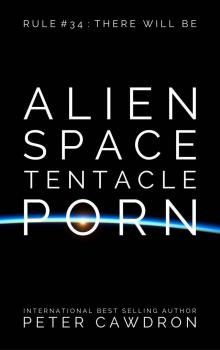 Alien Space Tentacle Porn
Alien Space Tentacle Porn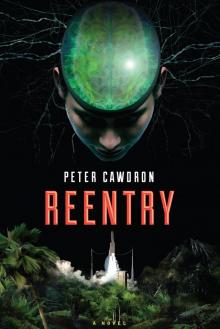 Reentry
Reentry Déjà Vu (First Contact)
Déjà Vu (First Contact) Wherever Seeds May Fall (First Contact)
Wherever Seeds May Fall (First Contact) But The Stars
But The Stars Trixie & Me
Trixie & Me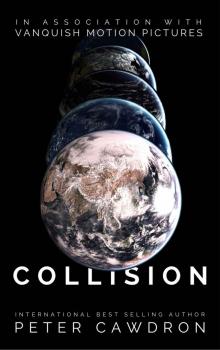 Collision
Collision Jury Duty (First Contact)
Jury Duty (First Contact)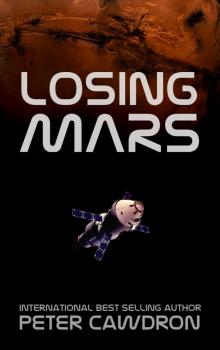 Losing Mars
Losing Mars We Are Legion (van Helsing Diaries Book 2)
We Are Legion (van Helsing Diaries Book 2) Van Helsing's Diaries (Books 1-3): Nosferatu
Van Helsing's Diaries (Books 1-3): Nosferatu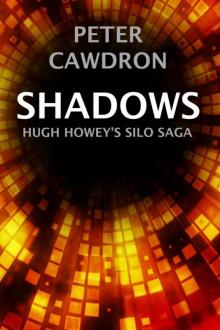 Shadows
Shadows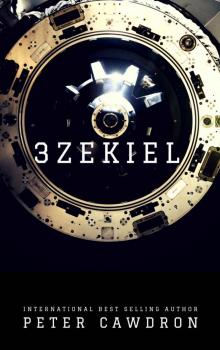 3zekiel (First Contact)
3zekiel (First Contact) Vampire (van Helsing Diaries Book 1)
Vampire (van Helsing Diaries Book 1) Xenophobia
Xenophobia All Our Tomorrows
All Our Tomorrows My Sweet Satan
My Sweet Satan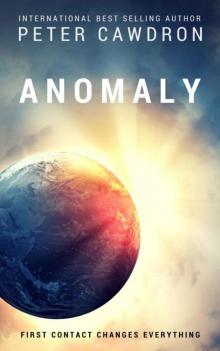 Anomaly
Anomaly Monsters
Monsters